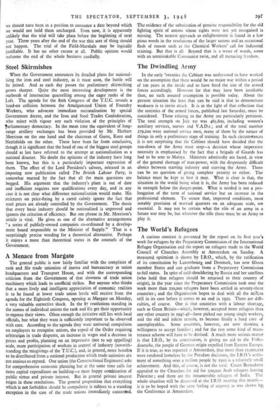The World's Refugees
A curious contrast is presented by the report on its first year's work for refugees by the Preparatory Commission of the International Refugee Organisation and the report on refugees made to the World Council of Churches Assembly at Amsterdam on Sunday. A measured optimism is shown by I.R.O., which, by the ratification of its constitution by Luxembourg and Denmark, has now fifteen member States and can graduate from a Preparatory Commission to full status. In spite of cold-shouldering by Russia and her satellites (who hold that refugees should be returned to their country of origin), in the year since the Preparatory Commission took over the work more than 200,000 refugees have been settled in seventy-throe countries ; and the Organisation hopes to deal with all the iniNon still in its care before it comes to an end in 1950. There are diffi- culties, of course. One is that countries with a labour shortage, such as Great Britain—which, however, accepted more refugees than any other country in 1947-48—have picked out young single workers, and the old and infirm remain, to become finally a hard core of unemployables. Some countries, however, are now showing a willingness to accept families ; and for the rest some kind of main- tenance scheme will have to be devised: A much more serious matter is that I.R.O., by its constitution, is giving no aid to the Volks- deutsche, the people of German origin expelled from Eastern Europe. If it is true, as was reported at Amsterdam, that more than 11,000,000 were rendered homeless by the Potsdam decisions, the I.R.O.'s settle- ment of something over a million people by 1950 is a relatively small achievement. And this, of course, is not the total. Count Bernadotte appealed to the Churches for aid for 5oo,000 Arab refugees leaving Palestine ; and there are the innumerable refugees of India. The whole- situation will be discussed at the I.R.O. meeting this month— it is to be hoped with the same feeling of urgency as was shown byj the Conference at Amsterdam.


































 Previous page
Previous page